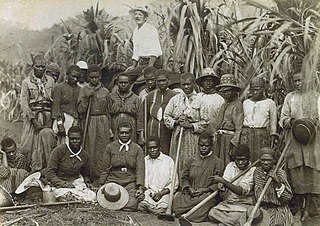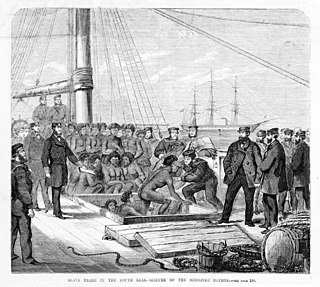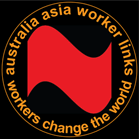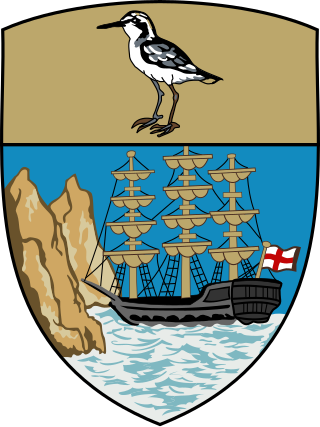Related Research Articles
A trade union or labor union, often simply referred to as a union, is an organization of workers whose purpose is to maintain or improve the conditions of their employment, such as attaining better wages and benefits, improving working conditions, improving safety standards, establishing complaint procedures, developing rules governing status of employees and protecting and increasing the bargaining power of workers.
The German Labour Front was the national labour organization of the Nazi Party, which replaced the various independent trade unions in Germany during the process of Gleichschaltung or Nazification.

Kanakas were workers from various Pacific Islands employed in British colonies, such as British Columbia (Canada), Fiji, Solomon Islands, Vanuatu, Papua New Guinea, and Queensland (Australia) in the 19th and early 20th centuries. They also worked in California and Chile.
In British politics, an affiliated trade union is one that is linked to the Labour Party. The party was created by the trade unions and socialist societies in 1900 as the Labour Representation Committee and the unions have retained close institutional links with it.

Blackbirding is the coercion of people through deception or kidnapping to work as slaves or poorly paid labourers in countries distant from their native land. The practice took place on a large scale with the taking of people indigenous to the numerous islands in the Pacific Ocean during the 19th and 20th centuries. These blackbirded people were called Kanakas or South Sea Islanders. They were taken from places such as Papua New Guinea, the Solomon Islands, Vanuatu, Niue, Easter Island, the Gilbert Islands, Tuvalu, Fiji, and the islands of the Bismarck Archipelago amongst others.
The Solomon Islands Labour Party is a political party in Solomon Islands. The party was founded in 1988 by the Solomon Islands Council of Trade Unions after the leadership of the union split. Joses Tuhanuku went on to lead the Labour Party, while Bartholomew Ulufa'alu led the Solomon Islands Liberal Party. Tuhanuku would be an MP for the party starting in 1989.

The Solomon Islands Liberal Party (SILP) was a political party in the Solomon Islands.
The ITUC Regional Organisation for Asia and Pacific is a regional organisation of the International Trade Union Confederation representing trade unions from countries in Asia and Oceania. It has 40 affiliated organisations in 28 countries, claiming a membership of 30 million people.

The British Western Pacific Territories (BWPT) was a colonial entity created in 1877 for the administration of a series of Pacific islands in Oceania under a single representative of the British Crown, styled the High Commissioner for the Western Pacific. Except for Fiji and the Solomon Islands, most of these colonial possessions were relatively minor.

Malaita is the primary island of Malaita Province in Solomon Islands. Malaita is the most populous island of the Solomon Islands, with a population of 161,832 as of 2021, or more than a third of the entire national population. It is also the second largest island in the country by area, after Guadalcanal.
Trade unions in South Africa has a history dating back to the 1880s. From the beginning unions could be viewed as a reflection of the racial disunity of the country, with the earliest unions being predominantly for white workers. Through the turbulent years of 1948–1991 trade unions played an important part in developing political and economic resistance, and eventually were one of the driving forces in realising the transition to an inclusive democratic government.
The organizations listed below constitute the Canadian Labour Congress, the national federation of trade unions:

The ICFTU Asia and Pacific Regional Organisation (APRO) was a regional organisation of the International Confederation of Free Trade Unions (ICFTU), representing trade unions from countries in Asia and Oceania.

Australia Asia Worker Links (AAWL) is an Australian non-government organisation active since 1979, established to forge international labour movement links in the Asia-Pacific region. Its office is in the Victorian Trades Hall Council building in Melbourne, Australia.

The Irish Trades Union Congress (ITUC) was a union federation covering the island of Ireland.
Joses Tuhanuku is a Solomon Islands politician and former trade union leader. He served three terms in Parliament before losing his seat in the 2006 general election.

Trade unions in Saint Helena emerged in the late 1950s in the flax industry and subsequently played a prominent role in the island's democratisation in the 1960s. The Saint Helena General Workers Union was the island's sole trade union throughout the latter half of the 20th century. In the 21st century, workers are mostly organised in the public sector in staff associations for nurses, teachers and public servants.
Trade unions in the Faroe Islands represent most workers in the country. The largest unions are:

Solomon Islands no longer has official diplomatic ties with Taiwan (ROC) due to the One-China policy since 2020.
References
- ICTUR; et al., eds. (2005). Trade Unions of the World (6th ed.). London, UK: John Harper Publishing. ISBN 0-9543811-5-7.[ verification needed ]